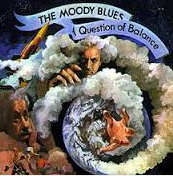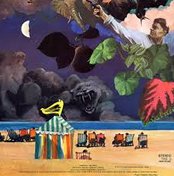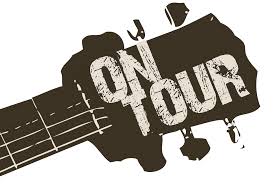 It's always good to be on tour when you are confident in the show, in the songs and the musicians around you. Right now it's a real, real pleasure and we are rolling along just fine - we just have to keep healthy, and sane. Touring is never easy and with one stumble things can get difficult.
There have been many stand out gigs over the years but one recent performance really stands out for me. Julie Ragins and Mike Dawes and me were playing the Fox Theater in Tucson in May last year and it was absolutely magical. There was a great vibe in the air, it is a very special old theatre and everything went right for us and the crew. Sometimes everything falls into place beautifully and that warm night in Tucson all the 'stars aligned'. I don't remember playing that town before - maybe that's why the audience swept us along so wonderfully.
Whenever I'm asked the question about a stand out Moodies gig it would have to be Madison Square Garden in the early '70's when we did two shows in one day. I think it was the first moment we thought 'maybe we have made it after all' and at the end of the night the building presented us with 'The Golden Ticket' award for selling more seats in the Garden than anyone else - only because we played it twice in one day - I think it was 5pm and 9pm shows. Me and Ray went outside between shows (nobody recognized us - it was the music that was famous) and gave away our guest tickets to anyone looking for a ticket. The scalpers weren't too pleased with us!
It's interesting the changes over the years that have come about around 'how' to tour. In the first few years we travelled in a car or a van - we were often late because we usually misjudged the driving, or leaving time, but we always seemed to make it somehow. Then, in the 1970's we moved up to taking scheduled flights between shows. That was really gruelling - it meant getting up really early, taking connecting flights and falling into bed exhausted knowing you only had about 4 hours before it all started again!
In the 1980's we moved up to a private plane - which was just great - as soon as we found out that you need a small plane for touring! Big aircraft can't land anywhere near most gigs. But the downside was that most of the time we were working just to pay for the airplane!
Lately we have been travelling by bus and that's the best way. American tour buses are fabulous and they become your 'home from home' for a tour. That's why so many artists tour with their own gorgeous buses. So, I think we have got it down now - until the next fad comes along that is.
It's always good to be on tour when you are confident in the show, in the songs and the musicians around you. Right now it's a real, real pleasure and we are rolling along just fine - we just have to keep healthy, and sane. Touring is never easy and with one stumble things can get difficult.
There have been many stand out gigs over the years but one recent performance really stands out for me. Julie Ragins and Mike Dawes and me were playing the Fox Theater in Tucson in May last year and it was absolutely magical. There was a great vibe in the air, it is a very special old theatre and everything went right for us and the crew. Sometimes everything falls into place beautifully and that warm night in Tucson all the 'stars aligned'. I don't remember playing that town before - maybe that's why the audience swept us along so wonderfully.
Whenever I'm asked the question about a stand out Moodies gig it would have to be Madison Square Garden in the early '70's when we did two shows in one day. I think it was the first moment we thought 'maybe we have made it after all' and at the end of the night the building presented us with 'The Golden Ticket' award for selling more seats in the Garden than anyone else - only because we played it twice in one day - I think it was 5pm and 9pm shows. Me and Ray went outside between shows (nobody recognized us - it was the music that was famous) and gave away our guest tickets to anyone looking for a ticket. The scalpers weren't too pleased with us!
It's interesting the changes over the years that have come about around 'how' to tour. In the first few years we travelled in a car or a van - we were often late because we usually misjudged the driving, or leaving time, but we always seemed to make it somehow. Then, in the 1970's we moved up to taking scheduled flights between shows. That was really gruelling - it meant getting up really early, taking connecting flights and falling into bed exhausted knowing you only had about 4 hours before it all started again!
In the 1980's we moved up to a private plane - which was just great - as soon as we found out that you need a small plane for touring! Big aircraft can't land anywhere near most gigs. But the downside was that most of the time we were working just to pay for the airplane!
Lately we have been travelling by bus and that's the best way. American tour buses are fabulous and they become your 'home from home' for a tour. That's why so many artists tour with their own gorgeous buses. So, I think we have got it down now - until the next fad comes along that is. Stand Out Performances and Being On Tour
 It's always good to be on tour when you are confident in the show, in the songs and the musicians around you. Right now it's a real, real pleasure and we are rolling along just fine - we just have to keep healthy, and sane. Touring is never easy and with one stumble things can get difficult.
There have been many stand out gigs over the years but one recent performance really stands out for me. Julie Ragins and Mike Dawes and me were playing the Fox Theater in Tucson in May last year and it was absolutely magical. There was a great vibe in the air, it is a very special old theatre and everything went right for us and the crew. Sometimes everything falls into place beautifully and that warm night in Tucson all the 'stars aligned'. I don't remember playing that town before - maybe that's why the audience swept us along so wonderfully.
Whenever I'm asked the question about a stand out Moodies gig it would have to be Madison Square Garden in the early '70's when we did two shows in one day. I think it was the first moment we thought 'maybe we have made it after all' and at the end of the night the building presented us with 'The Golden Ticket' award for selling more seats in the Garden than anyone else - only because we played it twice in one day - I think it was 5pm and 9pm shows. Me and Ray went outside between shows (nobody recognized us - it was the music that was famous) and gave away our guest tickets to anyone looking for a ticket. The scalpers weren't too pleased with us!
It's interesting the changes over the years that have come about around 'how' to tour. In the first few years we travelled in a car or a van - we were often late because we usually misjudged the driving, or leaving time, but we always seemed to make it somehow. Then, in the 1970's we moved up to taking scheduled flights between shows. That was really gruelling - it meant getting up really early, taking connecting flights and falling into bed exhausted knowing you only had about 4 hours before it all started again!
In the 1980's we moved up to a private plane - which was just great - as soon as we found out that you need a small plane for touring! Big aircraft can't land anywhere near most gigs. But the downside was that most of the time we were working just to pay for the airplane!
Lately we have been travelling by bus and that's the best way. American tour buses are fabulous and they become your 'home from home' for a tour. That's why so many artists tour with their own gorgeous buses. So, I think we have got it down now - until the next fad comes along that is.
It's always good to be on tour when you are confident in the show, in the songs and the musicians around you. Right now it's a real, real pleasure and we are rolling along just fine - we just have to keep healthy, and sane. Touring is never easy and with one stumble things can get difficult.
There have been many stand out gigs over the years but one recent performance really stands out for me. Julie Ragins and Mike Dawes and me were playing the Fox Theater in Tucson in May last year and it was absolutely magical. There was a great vibe in the air, it is a very special old theatre and everything went right for us and the crew. Sometimes everything falls into place beautifully and that warm night in Tucson all the 'stars aligned'. I don't remember playing that town before - maybe that's why the audience swept us along so wonderfully.
Whenever I'm asked the question about a stand out Moodies gig it would have to be Madison Square Garden in the early '70's when we did two shows in one day. I think it was the first moment we thought 'maybe we have made it after all' and at the end of the night the building presented us with 'The Golden Ticket' award for selling more seats in the Garden than anyone else - only because we played it twice in one day - I think it was 5pm and 9pm shows. Me and Ray went outside between shows (nobody recognized us - it was the music that was famous) and gave away our guest tickets to anyone looking for a ticket. The scalpers weren't too pleased with us!
It's interesting the changes over the years that have come about around 'how' to tour. In the first few years we travelled in a car or a van - we were often late because we usually misjudged the driving, or leaving time, but we always seemed to make it somehow. Then, in the 1970's we moved up to taking scheduled flights between shows. That was really gruelling - it meant getting up really early, taking connecting flights and falling into bed exhausted knowing you only had about 4 hours before it all started again!
In the 1980's we moved up to a private plane - which was just great - as soon as we found out that you need a small plane for touring! Big aircraft can't land anywhere near most gigs. But the downside was that most of the time we were working just to pay for the airplane!
Lately we have been travelling by bus and that's the best way. American tour buses are fabulous and they become your 'home from home' for a tour. That's why so many artists tour with their own gorgeous buses. So, I think we have got it down now - until the next fad comes along that is. 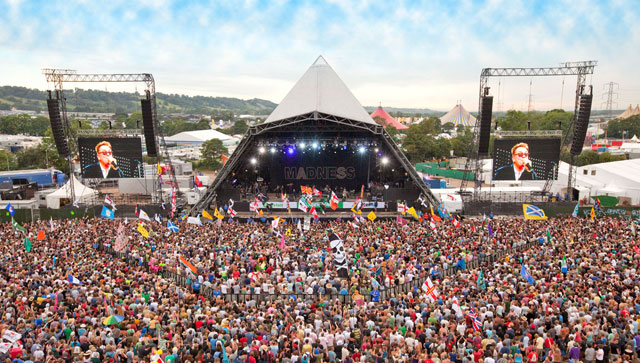
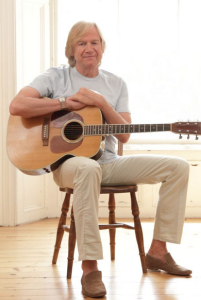
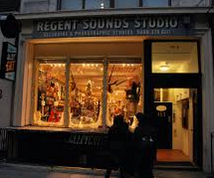 on instruments to fill out the sounds. I think we were only there for part of one day so we must have worked fast.
Although it was small and a bit rough round the edges the studio was already becoming legendary - The Stones had recorded their first album there - and I saw The Pretty Things there one day (they were a huge live band at the time - as powerful and (almost) as popular as the Stones). I remember the walls being covered with egg boxes to dampen the sound, and the engineer was quick and efficient. I hung around Denmark Street a lot in those days.
Within a year of those Marty recordings I was back in the same studio with The Moodies - I only remember recording "Leave This Man Alone" (not the greatest song - or recording that we ever made) and the first version of 'Really haven't Got The Time' that day, but we must have done a couple more tracks while we were there. I loved the little studio though and I'm so glad to have recorded at Regent Sound in it's most productive and famous days.
My first experience of big record company studios was at Pye studios near Marble Arch, where I recorded my first solo records with producer Alan Freeman. But - as soon as I entered the Decca studios at Broadhurst Gardens, West Hampstead I was hooked. It was such a wonderful magical complex of workshops, cutting rooms, full sized studios, control rooms and offices, with an efficient canteen, a caretaker (imagine how he must have felt with us working through the long nights) and a personnel officer with a sense of humour (evidenced by some of the 'larger than life' characters employed there). For musicians it was a fun palace - full of great music, laughs and strange happenings. All generations thrived at Decca and we all knew it was a privilege to be part of it - and of course, it was never to be taken too seriously!
Our first sessions were in Decca No 2, they called it the rock and roll studio, downstairs at Broadhurst Gardens, which had a brilliant well hammered Steinway piano. That piano featured on 'Fly Me High'.
I think 'Cities' was one of the first recordings we made there. After that we were regular visitors to the studios and when the idea for DOFP was put forward we were assigned the Decca No1 studio - it became our second home for many years after that and in the early 1970's Decca;s owner Sir Edward Lewis gave us the studio to create our own space and build the first Westlake studio outside of the USA. I worked and recorded in lots studios in London and all over the world in those years - but nothing else came close to Decca No 1.
Decca had the greatest engineers and technicians in Britain, and their training and experience was invaluable. Derek Varnals and Alberto Parodi are the best engineers I have know in this long journey, but Derek created the historic recordings that the Moodies will (hopefully) be known for.
As for Broadhust Gradens studios themselves, as you entered the building (which was once the West Hampstead town hall), and came up the impressive steps, Decca No 1 studio was directly in front of you, past the reception desk which was on your right (the broom cupboard where Ray and myself wrote some early things was on the left).
Two large double doors opened out to the big high ceiling studio. It was the full height of the building which, apart from the basement below No 1, was three or four stories high elsewhere. As you entered the vast studio room the floor was oak parquet which gave way to carpet half way across the space. Then on to the raised 'stage' area, set beneath the small control room window that was set high up near the roof.
At the back of the stage, underneath the control room, were set a row of deep cupboards that housed microphones, music stands, chairs and lots of other assorted equipment, including my own acoustic double bass, the one that I played on a quite a few Moodies recordings. Two flights of stairs led up to the control room, where the engineers wore white lab coats and the assistant engineers (or 'tape ops') wore brown lab coats.
I wasn't until each final 'take' of a session was pronounced done that the group, was invited in to the control room, and any time in there was precious as musicians and artists opinions were not always welcome. The engineers and producers communicated with the musicians through speakers placed down in the studio.
But after DOFP we were all in it together and each one of us had 'all access'. The success we had, and shared, in those studios mean that I can remember every detail of that wonderful place, and our dreams were fulfilled there.
on instruments to fill out the sounds. I think we were only there for part of one day so we must have worked fast.
Although it was small and a bit rough round the edges the studio was already becoming legendary - The Stones had recorded their first album there - and I saw The Pretty Things there one day (they were a huge live band at the time - as powerful and (almost) as popular as the Stones). I remember the walls being covered with egg boxes to dampen the sound, and the engineer was quick and efficient. I hung around Denmark Street a lot in those days.
Within a year of those Marty recordings I was back in the same studio with The Moodies - I only remember recording "Leave This Man Alone" (not the greatest song - or recording that we ever made) and the first version of 'Really haven't Got The Time' that day, but we must have done a couple more tracks while we were there. I loved the little studio though and I'm so glad to have recorded at Regent Sound in it's most productive and famous days.
My first experience of big record company studios was at Pye studios near Marble Arch, where I recorded my first solo records with producer Alan Freeman. But - as soon as I entered the Decca studios at Broadhurst Gardens, West Hampstead I was hooked. It was such a wonderful magical complex of workshops, cutting rooms, full sized studios, control rooms and offices, with an efficient canteen, a caretaker (imagine how he must have felt with us working through the long nights) and a personnel officer with a sense of humour (evidenced by some of the 'larger than life' characters employed there). For musicians it was a fun palace - full of great music, laughs and strange happenings. All generations thrived at Decca and we all knew it was a privilege to be part of it - and of course, it was never to be taken too seriously!
Our first sessions were in Decca No 2, they called it the rock and roll studio, downstairs at Broadhurst Gardens, which had a brilliant well hammered Steinway piano. That piano featured on 'Fly Me High'.
I think 'Cities' was one of the first recordings we made there. After that we were regular visitors to the studios and when the idea for DOFP was put forward we were assigned the Decca No1 studio - it became our second home for many years after that and in the early 1970's Decca;s owner Sir Edward Lewis gave us the studio to create our own space and build the first Westlake studio outside of the USA. I worked and recorded in lots studios in London and all over the world in those years - but nothing else came close to Decca No 1.
Decca had the greatest engineers and technicians in Britain, and their training and experience was invaluable. Derek Varnals and Alberto Parodi are the best engineers I have know in this long journey, but Derek created the historic recordings that the Moodies will (hopefully) be known for.
As for Broadhust Gradens studios themselves, as you entered the building (which was once the West Hampstead town hall), and came up the impressive steps, Decca No 1 studio was directly in front of you, past the reception desk which was on your right (the broom cupboard where Ray and myself wrote some early things was on the left).
Two large double doors opened out to the big high ceiling studio. It was the full height of the building which, apart from the basement below No 1, was three or four stories high elsewhere. As you entered the vast studio room the floor was oak parquet which gave way to carpet half way across the space. Then on to the raised 'stage' area, set beneath the small control room window that was set high up near the roof.
At the back of the stage, underneath the control room, were set a row of deep cupboards that housed microphones, music stands, chairs and lots of other assorted equipment, including my own acoustic double bass, the one that I played on a quite a few Moodies recordings. Two flights of stairs led up to the control room, where the engineers wore white lab coats and the assistant engineers (or 'tape ops') wore brown lab coats.
I wasn't until each final 'take' of a session was pronounced done that the group, was invited in to the control room, and any time in there was precious as musicians and artists opinions were not always welcome. The engineers and producers communicated with the musicians through speakers placed down in the studio.
But after DOFP we were all in it together and each one of us had 'all access'. The success we had, and shared, in those studios mean that I can remember every detail of that wonderful place, and our dreams were fulfilled there. 